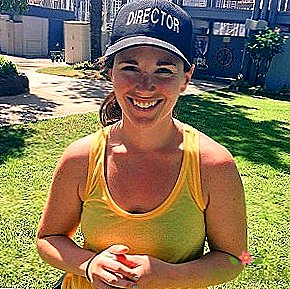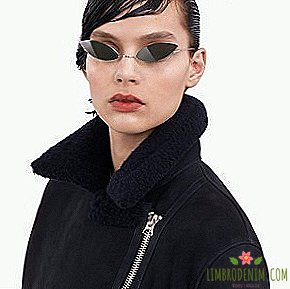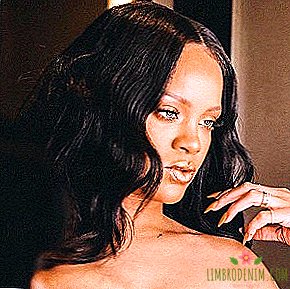“When will the real director come?”: On the work of women in Hollywood
IN RUBRIC "BUSINESS" We acquaint readers with women of different professions and hobbies that we like or are simply interested in. This time the documentary woman Sarah Moshman became our heroine. Starting a career in television, Sarah raised money for her debut full meter - the documentary “Ordinary Women and Unusual Things”, which she traveled around the world with festivals. This is the story of women atypical professions - pilotess, astronaut, professor of mathematics and female admiral. Wonderzine met with Sarah in Moscow - she became a guest at the SHOW US festival of contemporary American documentary films - to discuss women's opportunities in the film industry and how the US women's agenda has changed over the past few years.
About sexism
I grew up in Chicago and went to film school in Miami. I always liked documentaries - more than narrative movies. And after the film school I went to Hollywood. There I was shooting mostly reality shows, I learned a lot, but I still didn’t feel that I was telling really important stories - too much of these broadcasts was left out. At about the same time, I began to notice the lack of strong female images and role models: even now there are not enough women in the media space.
My parents never said that it would be harder for me, because I am a woman - in time, I found out for myself. My mother worked at the age of 18 as a chemical engineer, then became a lawyer, always worked and actively brought me up - I felt like a very beloved child. My dad - documentary filmmaker and television director - never discouraged me from film schools. As soon as I started working, I understood everything: working in groups only with men, prejudices against women, obstacles that were passed down to us from previous generations.
When I studied as a director and worked on TV, I constantly had to deal with pressure from outside. Suppose you are in a class - twenty guys and two girls: and even that makes you feel less significant. It’s as if you don’t need to take a seat, and it’s still obvious to all that guys will always be ahead, because supposedly from birth they can keep the camera right. It is not clear where this myth came from, but it is very tenacious. Guys are more technical, and we should be nice and polite, strive for perfection and stay beautiful. Perhaps, if we didn’t think every day about how we would look, we would have a lot of time freed up for everything else.
There is a lot of sexism and harassment on television, but the main problem is that there are blind spots everywhere. You never understand when you need to loudly declare a problem, and when - to treat everything calmly. I did not want to expose anyone and pay too much attention to myself: I just wanted to do my job well, save my career and, if possible, move up the stairs. At some point, however, I no longer understood what it means “upward” and what I’m generally going to do — my films became a way out of this impasse.
Yes, I think that all women experience, to varying degrees, harassment in the entertainment industry. The edges are very blurred, and it is convenient: no one knows whether you are in a professional situation or you just spend time together. It was obvious to me where the border was, but never to the other side. Pat you on the leg, hunt between times or something like that. Anyway, being a female director on a television platform is too strong an impression. I was constantly asked when would a real cameraman or director come? People needed to quickly rebuild their definition of a profession before my eyes. I do not mind setting an example or being a pioneer, but constantly proving something to others simply exhausts.
I made sure that men are often chosen for their potential, and women for a clear list of past achievements. You have to do exactly this job in the past, so that you calmly take on a new job with the same responsibilities. And you also have to be very strong to be left at work - if you are lucky, you can even timidly ask for higher fees. It works differently with guys: "Well, you know how the camera works! Everything will be fine." I truly believe in the best in people, and I think most of this is unconscious reactions. In general, I try to forgive people their prejudices. I have them too.
If you do not have women in leadership positions in a television station, you will not see a TV show with women - this is just a proven fact. When Gina Davis did research into extras, then even in him she found out that in an ordinary crowd of men twice as many as women.
I did 10 seasons of "Dancing with the Stars" and several cooking shows. In general, nothing terrible, but even there, standard gender roles, typical expectations from heroes, surfaced. Behind the scenes, the dynamics are also approximately the same everywhere: people struggle for power and attention, in communication there is a lot of sexism and a constant transition of personal boundaries. And then I worked on a pretty nice show Made on MTV - there was a mentor on one of his chosen interests with teenagers. For example, an ordinary schoolboy was trained on a skateboarder and a musician — such a dream performance show: a pretty good idea, and I shot it myself with the hero.
About the women's project and money
For our project, we were going to shoot 10 people, and then the number suddenly doubled. Incredible women with great achievements are everywhere - you just need to look around. It was impossible to come to some heroines just like that - for example, to Admiral of the Navy: you can’t just call and ask her to call. Many interviews were not confirmed until the last moment, and we had to improvise.
Many female directors are uncomfortable to raise money for the "female" project: they treat crowdfunding as a cry for help - support us, otherwise we will not cope! I had no options - I had to get a budget for the film, and I easily overcame all the prejudices. Our donors were half of our acquaintances, half of them were completely outsiders: there were twice as many women as men. It is very important to immediately have access to an additional layer of people - not from your own environment, and test the viability of the idea against them. Crowdfunding is never about a person who is asking for donations, but about an idea for which he needs money. Do you need your project to random people enough to open wallets and get 20 dollars from there?
A lot of women work for me - in general, I try to hire nice people with an eye on women when it is possible. Sound engineer, graphic designer, film composer are standard male professions: I work for women. And I also appreciate the role of the mentor, so I try to include in the production of novice female directors who need experience. Of course, I do not drive them around the site for coffee - I just want them to see how the filming process is organized, and then they are not afraid to do something of their own.
We thought we were making a film for young girls, but young guys also responded - and this is important. You can not talk about feminism, inviting to the conversation only half of humanity. Men do not have enough female role models just as badly as we do. You can gather in close female circles, feel comfort and mutual understanding, and then go to the ordinary world - the same as before. If men are brought up in a world where their female colleagues are equal to them, if we talk with them directly about this, a lot can change. Among our viewers was an 11-year-old boy, the son of a lonely mother, who said he was used to strong women, but he never knew how much his mother made efforts to become successful, and how many obstacles she had to go through.
About terms and celebrities
I often encounter in the States that people do not like labels and they avoid defining "feminist" in a public field. There are still strong prejudices that feminists do not like children, do not want to wear makeup or against flowers as a gift. Many Americans like to say - “I am not a feminist, I am a humanist” - and I understand what they mean. I am also for human rights, but maybe we will talk about how to make women's life easier? In general, in my experience, people do not like any characteristics with an ending to -ist. Celebrities also behave contradictory - some literally on every corner talk about feminism, others turn back from that word so as not to scare off fans. There is no consensus even in America.
The Future is Female - obviously a trend. I myself have such a T-shirt, and I proudly wear it. What exactly has changed - very few people now need to explain what feminism is: in America, in general, everyone has an idea. Celebrity influence is great if it is sincere and benefits the common agenda. We didn’t want to add famous people to our film - any producer and marketer would say that this is a mistake. But for us it was important to save the film from any touch of celebrity culture and show ordinary people who know how to achieve significant results. We did not want to go on the road "if you are not on a TV set, you are a loser" - this is some kind of wrong approach to the choice of heroes. Well, the choice of actresses, singers and models - often objectified - would also not benefit the general idea.
Our second film is the story of four women who started a big charity project and I really liked it when I personally met. All of them are non-professional athletes who rowed and risked their lives not for fame, but because of principles and beliefs. I liked them because they were also like "ordinary women" who participated in a huge project not for themselves. Now the film got on Netflix, and my heroines in it, it seems, did the impossible - swam across the Pacific Ocean.
Now I'm pregnant - I say for those who can not see it. Birth in a couple of months, I will have a daughter - and this is very inspiring to me. After the promotion of the previous film, I took up the production of the next project - about sexual harassment. This is a common labor problem, unfortunately, with a strong negative influence. This time I want to leave the American context and look at the situation from the perspective of people from different countries. I am generally interested in phenomena outside our country, so I will study all the information available to me around the world.





